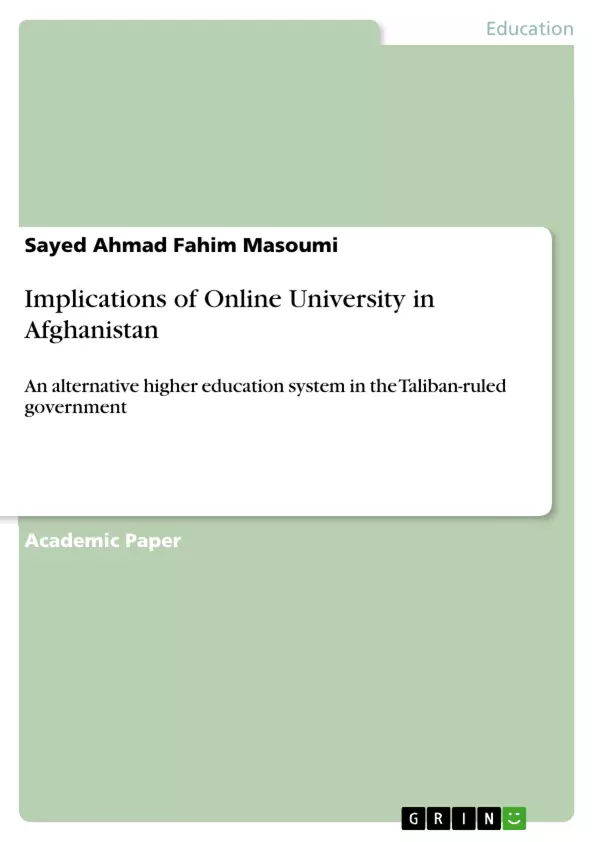The backbone of development in a country is education. It makes the nation more visionary, increases men’s and women’s participation, increases socialization, and creates a healthy society. At the time of war and in post-conflict situations, education has implications and challenges with social and political turbulence. This paper discusses the implications of an alternative approach in higher education as e-learning or distance learning within a war-stricken context through a literature review. This paper brings e-learning case studies from Ukraine and Saudi Arabia. It then shifts toward Afghanistan, with a significant focus on Afghanistan’s diverse problems that led to the proposal of establishing AOU by WUS.
Inhaltsverzeichnis (Table of Contents)
- 1 Introduction
- 1.1 Afghanistan
- 2 Problem Analysis
- 2.1 Sectoral and Institutional Context
- 2.1.1 Higher Education Outlook in Afghanistan
- 3 Presentation of Data
- 3.1 Ukraine
- 3.2 Saudi Arabia
- 3.3 Afghanistan
- 3.3.1 Afghan Online University Requirements
- 4 Conclusion
Zielsetzung und Themenschwerpunkte (Objectives and Key Themes)
This literature review examines the implications of establishing an online university in Afghanistan, particularly in the context of the Taliban-ruled government. It explores the potential of e-learning as an alternative higher education system in a war-stricken country, drawing comparisons with e-learning case studies from Ukraine and Saudi Arabia. The review aims to analyze the challenges and opportunities of online education in Afghanistan and to propose a framework for establishing the Afghan Online University (AOU).
- The potential and challenges of online education as an alternative higher education system in war-torn countries.
- The specific implications of online education in Afghanistan, considering the country's socio-political context and existing higher education infrastructure.
- Comparison of e-learning models in Ukraine and Saudi Arabia to draw lessons applicable to Afghanistan.
- The feasibility and potential benefits of establishing the Afghan Online University (AOU).
- The role of technology in promoting education and development in Afghanistan.
Zusammenfassung der Kapitel (Chapter Summaries)
The introduction lays the groundwork by defining the importance of education in national development, particularly in post-conflict situations. It highlights the specific challenges facing Afghanistan's higher education system.
The "Problem Analysis" section examines the sectoral and institutional context of higher education in Afghanistan, outlining the existing challenges and limitations. It delves into the specific issues hindering access to quality education in the country.
The "Presentation of Data" chapter provides case studies of e-learning implementation in Ukraine and Saudi Arabia. This analysis highlights the benefits, challenges, and best practices of online education in different contexts.
The final chapter focuses on the feasibility and potential benefits of establishing an online university in Afghanistan. It explores the specific requirements and considerations for creating a sustainable and effective e-learning platform in the country.
Schlüsselwörter (Keywords)
The primary keywords and focus topics of this literature review include Afghanistan, e-learning, online education, Taliban, higher education, development, technology, Saudi Arabia, Ukraine, Afghan Online University (AOU), and the role of technology in post-conflict situations.
Frequently Asked Questions
Why is education critical for Afghanistan's development?
Education is the backbone of national development, increasing socialization, healthy societal growth, and the participation of both men and women in the nation's future.
What is the Afghan Online University (AOU)?
The AOU is a proposed framework for a distance-learning higher education system designed to provide access to quality education despite the social and political turbulence in Afghanistan.
What lessons can Afghanistan learn from Ukraine's e-learning model?
The case study of Ukraine demonstrates how e-learning can be maintained as an alternative system during conflict to ensure educational continuity.
How does the Taliban rule affect higher education?
The socio-political context under the Taliban creates significant barriers to traditional education, making digital and online alternatives like the AOU essential for reaching students.
What are the main requirements for establishing an online university in Afghanistan?
Key requirements include technological infrastructure, digital literacy, sustainable platforms, and addressing the diverse sectoral problems within the current Afghan higher education outlook.
- Quote paper
- Sayed Ahmad Fahim Masoumi (Author), 2022, Implications of Online University in Afghanistan, Munich, GRIN Verlag, https://www.hausarbeiten.de/document/1296599


